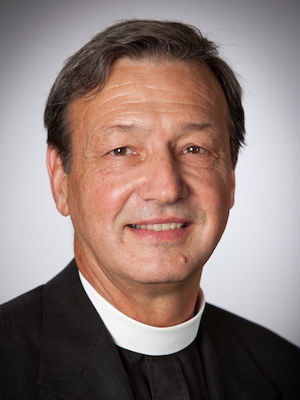Adapting to Covid, Adapting for the Church’s Future

This column originally ran in the Fall 2020 issue of CDSP’s Crossings magazine.
It is refreshing to be in touch with the Crossings community once again. There is so much to say in this column in light of conditions we all are facing. I know each of you has a story about the challenges you have faced over the last nine months. We must hold each other in prayer.
Let’s start with the obvious: the challenges of establishing school life under pandemic. Reopening this fall required new ways of functioning day to day at CDSP. Adding to the complexity were our deepening alertness to political polarization, racist social structures, mounting economic stress, and dramatic new symptoms of climate change.
These conditions impress upon us the importance of the vocation of spiritual leadership in a time of trial. I am grateful for how this community has accepted the challenge, adapted to circumstances beyond our control, and found avenues for mutual support.
Against this challenging backdrop, we have enjoyed a major blessing. For the first time, ordination-track seminarians studying with the support of a bishop entered or returned to CDSP with full tuition scholarships, no-cost housing, and supplements to their cost of food. The Board of Trustees, under the new Trinity-CDSP partnership, wants to support a radical reduction of the debt students face when they graduate. This long-awaited dream has finally come true, and I have heard stories of relief and deep gratitude from those who benefit. Thanks be to God.
In this column I will name the practical steps we have taken to make this school year happen, then close with a word about envisioning CDSP’s future.
New students who had been admitted before and during the onset of the pandemic, as well as continuing residential students, held firm in their desire to start the school year in Berkeley this fall. They arrived earlier than usual to meet health and safety protocols, including mandatory testing and quarantining to assure we started with a healthy community. We have plans in place in the case of illness.
These students for the most part are living on campus and forming cohort groups as usual. However, we are holding both classes and corporate worship in online-only formats and will continue in this mode during January Intersession and at least the start of Spring Semester. We keep our eyes on the local health conditions, ready for more flexibility when conditions permit.
The major hitch in this plan was the “congregate living” conditions (i.e., shared bathrooms) in our Parsons Hall dormitory. Unable to open Parsons or Gibbs this fall, we assigned students to apartments (Nichols) and single rooms in our retreat center (Easton). We are filled to capacity.
Some faculty are teaching from their classrooms to make use of new equipment introduced this summer to support both online and in-person learning. In recent years, we have become a leader among Episcopal seminaries in the art of online pedagogy. We are now drawing on our strengths in this area still further.
As we continue setting priorities for CDSP’s growth and development, we remain committed to building a culture of adaptation. We trust God to transform us, as individuals and as a Church.
Similarly, we remain committed to a program centered on mission, evangelism, and discipleship, preparing leaders who will support communities in spiritual growth and share Good News in their neighborhoods and other community contexts.
We are pursuing the expansion of degree programs to prepare both lay and ordained leaders for ministries within and beyond congregational life. We are deepening our expertise in teaching practical skills for ministry: executive leadership, change management, administration and finance, along with the classical theological disciplines at the core of who we are.
We will also continue to develop online pedagogies and programs to match ever-changing educational technologies and to meet the exciting and growing need for low-residential and bi-vocational education.
I began by mentioning the political climate of our day. If anything should break up the “ivory tower” model of the academy, it is our fraying civic life and injustice on the rise. We must engage, and do so prayerfully, intelligently, and in coalition and solidarity with the people our systems ignore or abuse.
I believe the current political environment provides an extraordinary context for the application of spiritual and moral discourse—walking the talk, with Jesus as our exemplar. The time is ripe for testing our own fiber, and for awakening and strengthening the community of God’s faithful.

